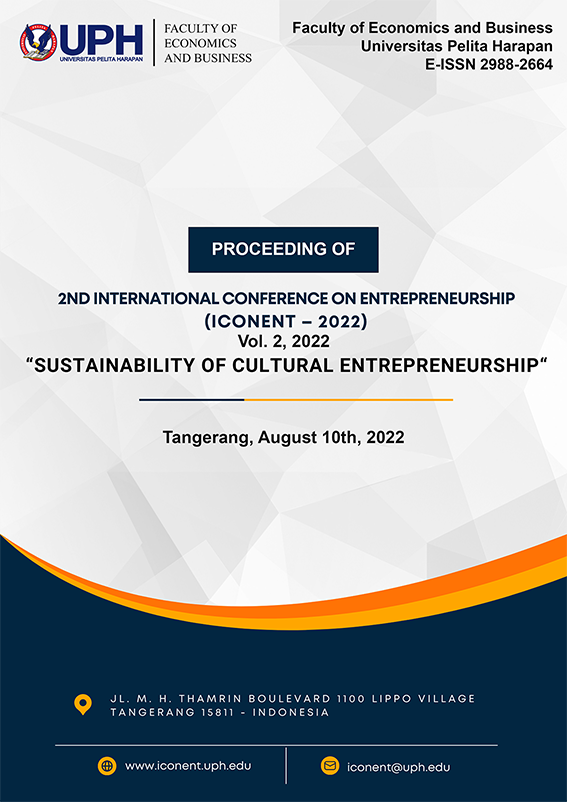NEED ANALYSIS FOR ENGLISH COMPETENCY-BASED BUSINESSES THROUGH INTENSIVE LEARNING PROGRAMS
Keywords:
needs analysis, English, intensive courseAbstract
The urgency of mastering English in Indonesia is very high. This phenomenon reflects the rapid development of technology in recent decades. On the other hand, English proficiency in Indonesia is still very low. Formal educational institutions for elementary, junior high, high school, and university still cannot answer students' needs for quality English. Therefore, there is a desire to enrich English competence through Intensive Courses. This condition can be seen as an opportunity for educational-based entrepreneurs who want to develop their businesses in a non-academic context. Before building a language competency-based business, a mapping of prospective students' needs is essential. This article involves 152 students as respondents to find out the current learning needs of students. Questionnaires were distributed with the aim of (1) providing an overview of the things students need and want, referring to the knowledge they have; (2) describing students' current English language skills; (3) Learning needs are related to what must be done to learn. This questionnaire analyzes the things that need to be developed in an English language course that can answer and facilitate students' needs. The results are that English courses should focus on conversation and writing skills to support students' work and academic needs.
References
[1] D. Crystal, English as a Global Language , 2nd ed. Cambridge: Cambridge University Press, 2003.
[2] R. M. P. Silalahi, “Linguistic Imperialism : Native-Speakerism from the Perspective of Non-Native English Learners.,” Journal of ELT Research, vol. 4, no. 1, pp. 73-84, 2019.
[3] K. Wu and C. Ke, “Haunting Native Speakerism? Students’ Perceptions toward Native Speaking English Teachers in Taiwan,” English Language teaching, vol. 2, no. 3, 2009, Accessed: Aug. 02, 2022. [Online]. Available: https://eric.ed.gov/?id=EJ1083097
[4] R. M. Silalahi and U. Yuwono, “The Sustainability of Pancasila in Indonesian Education System,” Research in Social Sciences and Technology, vol. 3, no. 2, pp. 58-78, May 2018, doi: 10.46303/ressat.03.02.4.
[5] Y. Sulistyoningrum, “KURSUS BAHASA INGGRIS: Saat Ini Tersedia 4.583 Tempat Belajar,” Bisnis.com, 2015. https://ekonomi.bisnis.com/read/20151106/12/489568/kursus-bahasa-inggris-saat-ini- tersedia-4.583-tempat-belajar (accessed Aug. 02, 2022).
[6] S. W. Harahap, “”˜Mas Mendikbud, Belajar Bahasa Inggris Cukup Setahun.,’” Tagar. ID, 2019. https://www.tagar.id/mas-mendikbud-belajar-bahasa-inggris-cukup-setahun (accessed Aug. 02, 2022).
[7] M. I. Bustomi, “Anies Imbau Lembaga Kursus dan Sekolah Nonformal di DKI Juga Tutup Dua Pekan Artikel ini telah tayang di Kompas.com dengan judul ”˜Anies Imbau Lembaga Kursus dan Sekolah Nonformal di DKI Juga Tutup Dua Pekan,’” Kompas.com, Apr. 14, 2020. https://megapolitan.kompas.com/read/2020/03/14/18013901/anies-imbau-lembaga-kursus-dan-sekolah-nonformal-di-dki-juga-tutup-dua (accessed Aug. 02, 2022).
[8] Sri. Muryono, “”˜Anies Tutup Lembaga Kursus Dan Sekolah Nonformal.,’” 2020. https://www.antaranews.com/berita/1356182/anies-tutup- lembaga-kursus-dan-sekolah-nonformal (accessed Aug. 02, 2022).
[9] S. Fadel and H. Rajab, “Investigating the English Language Needs of the Female Students at the Faculty of Computing and Information Technology at King Abdulaziz University in Saudi Arabia,” English Language Teaching, vol. 10, no. 6, p. 69, May 2017, doi: 10.5539/elt.v10n6p69.
[10] R. K. Sari, “Analisis Kebutuhan Pembelajaran Bahasa Inggris pada Mahasiswa Kelas Karyawan,” SAP (Susunan Artikel Pendidikan), vol. 4, no. 1, Aug. 2019, doi: 10.30998/sap.v4i1.3612.
[11] A. Davies and J. Munby, “Communicative Syllabus Design,” TESOL Quarterly, vol. 15, no. 3, p. 332, Sep. 1981, doi: 10.2307/3586758.

 Fakultas Ekonomi dan Bisnis | Universitas Pelita Harapan | Kampus Universitas Pelita Harapan | Gedung F Lt. 12 | Lippo Karawaci, Tangerang - 15811 | Telp 021-5460901 | Fax 54210992
Fakultas Ekonomi dan Bisnis | Universitas Pelita Harapan | Kampus Universitas Pelita Harapan | Gedung F Lt. 12 | Lippo Karawaci, Tangerang - 15811 | Telp 021-5460901 | Fax 54210992